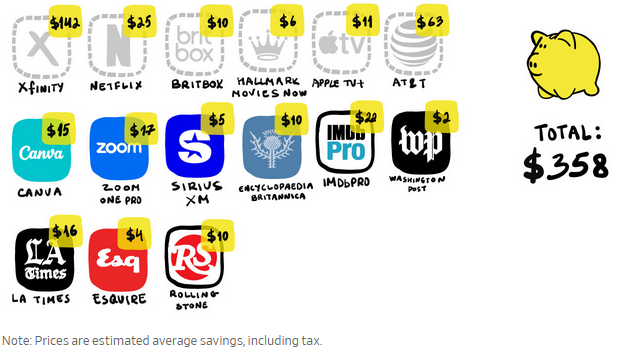Two questions sit before Congress over the coming year, as posed (correctly IMNSHO) by The Wall Street Journal in its headline and lede:
Republicans’ $4 Trillion Question: Should They Pay for Extending Trump Tax Cuts?
And
Republicans want to extend the Trump-era tax cuts that lapse after 2025. A big point of debate now: should they cover any or all of the $4 trillion cost—and how?
The terminology confusion is illustrated by the WSJ‘s change in wording from “pay for” in its headline to “cover” in its lede.
It’s long been my contention that it doesn’t cost the government anything to not get what doesn’t belong to it in the first place; there’s nothing for which government need pay. On the other hand, there’s the real world imbalance between tax collections and spending when the latter exceeds the former, as any grade schooler understands when he wants to spend more than his allowance will cover, whether he’s saved fractions of his allowance against an upcoming large expenditure or he’s spending as he gets. And, yes, the analogy is that direct.
There’s also the real world, empirically demonstrated, fact that within broad limits, the more money left in the hands of us average Americans and our businesses—the nation’s private economy—the more economic activity, now including government spending, there is overall, and from that increase, revenues to government, those tax collections, increase even in the face of reduced tax rates. The broad limit is the minimum of tax collections—the allowances we grant the government—needed to cover the constitutionally mandated spending requirements of paying the government’s debts, providing for an adequate national defense, and paying for the constitutionally defined items constituting the general Welfare.
Given the government’s current spending levels, that increased economic activity-driven increase in revenues to government won’t cover all of the government’s spending. That spending includes vast amounts of welfare spending. In the early days of our republic, we couldn’t afford any welfare spending, to the point that then-Congressman James Madison made a constitutional argument against helping Haitian refugees in the aftermath of an earthquake. From the Annals of Congress, House of Representatives, 3rd Congress, 1st Session:
Mr Madison wished to relieve the sufferers, but was afraid of establishing a dangerous precedent, which might hereafter be perverted to the countenance of purposes very different from those of charity. He acknowledged, for his own part, that he could not undertake to lay his finger on that article in the Federal Constitution which granted a right of Congress of expending, on objects of benevolence, the money of their constituents.
The inability to identify the Article remains today, but that notwithstanding, our republic’s weal has improved to the point that we can, as a nation, afford a measure of welfare for our citizens (and for other nations, but that’s for another discussion). But not too much. The external threats to our nation have grown immensely, and so has the cost of our defending ourselves against them. Profligacy in spending, especially after WWII, has so far exceeded tax collections that our national debt has exploded, and the need to pay that down and then off, also has grown commensurately.
Spending outside those three constitutional mandates needs to be greatly cut back. There are three types of that extra spending that come to mind out of the myriad of them. These are Social Security, Medicare/Medicaid, and infrastructure.
I’ve written before about those first two; I’ll only summarize here: privatize Social Security and Medicare, which will be deucedly expensive in the transition, but that cost will only get worse with delay—and doing nothing will itself result in a 25% cut in Social Security payout, anyway, within the next 10 years, and an even more severe cut in Medicaid, if after a longer delay. Medicaid transfers to each of the several States should be converted to block transfers on an annually declining basis until the block grants have bee eliminated altogether. Medicaid is after all, and as it should be, a State-run program.
Regarding infrastructure, all Federal transfers to the States should be on a matching basis, with the States required to make the first and then sustained moves: no money should flow from Federal coffers to a State until the State has let contracts with the builders; ground has been broken; and concrete, publicly measurable and assessable progress has been made in the building. The match itself should be no more than 50% of what the State has spent and subsequently spends in accordance with its contracted schedule, and those subsequent Federal transfers should flow only after the State has spent its own citizens’ tax remittances on the State’s contracted schedule.
None of that is possible, though, without clearing up that terminology confusion. As long as politicians think tax monies remitted to government are owed to and are the property of government, they’ll spend and tax without limit.

